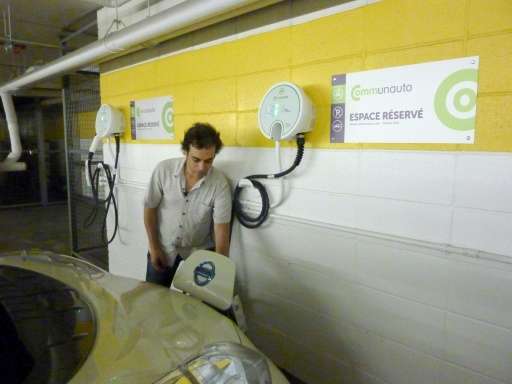Subsidizing electric vehicles inefficient way to reduce CO2 emissions: study

Subsidizing the purchase of electric cars in Canada is an inefficient way to reduce greenhouse gas emissions that is not cost effective, according to a Montreal Economic Institute study released Thursday.
"It's just a waste," said Germain Belzile, one of the authors of the study, which examined electric vehicle subsidies offered by Canada's two biggest provinces Ontario and Quebec, which can rise to as much as a third of a vehicle's purchase price, depending on the model.
"Not only do these programs cost taxpayers a fortune, but they also have little effect on GHG emissions," he said.
The government of Quebec has set a goal of having one million electric and hybrid vehicles on its roads by 2030, up from 6,000 currently. Ontario has the same objective.
On this basis, said Belzile, carbon emissions would fall by about 3.6 percent in Quebec and 2.4 percent in Ontario.
The two provinces have said they aim to reduce CO2 emissions by about 37 percent by 2030, from 1990 levels.
Quebec is offering rebates of up to Can$8,000 for the purchase of new electric or rechargeable hybrid cars—which are significantly more expensive than their gas-guzzling counterparts—while Ontario is offering to refund Can$14,000 of the purchase price.
The study estimates that these subsidies cost taxpayers Can$523 per tonne of GHG not emitted in Ontario and Can$288 in Quebec.
By comparison, a cap and trade system for big polluters in Quebec and the US state of California, which Ontario is due to join soon, costs a mere Can$18 per tonne.
In subsidizing electric vehicle purchases, Ontario and Quebec end up spending up to 29 times and 16 times, respectively, the carbon market price for each tonne of GHGs eliminated.
"Common sense, both economically and ecologically speaking, argues in favor of reducing these subsidies, and even eliminating them," the study concludes.
More information: The Economic Note entitled "Are Electric Vehicle Subsidies Efficient?" was prepared by Germain Belzile, Senior Associate Researcher at the MEI, and Mark Milke, independent policy analyst. www.iedm.org/71215-are-electri … -subsidies-efficient
© 2017 AFP




















